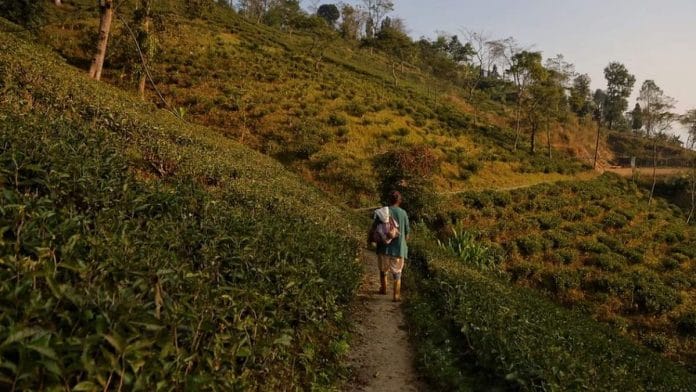Thank you dear subscribers, we are overwhelmed with your response.
Your Turn is a unique section from ThePrint featuring points of view from its subscribers. If you are a subscriber, have a point of view, please send it to us. If not, do subscribe here: https://theprint.in/subscribe/
The ongoing crisis in Bengal demands your attention. While the epicentre may be West Bengal, India, where Bengali is the language of expression, I chose English, hoping to reach beyond the borders of space and the constraints of language. This is not the time for poetic musings or romantic elegance. This is an urgent clarion call—a plea for focused, undistracted engagement. Bengal is burning, and we must ask ourselves: how long will we ignore this disaster while still claiming to champion justice, avant-garde intellectualism, freedom, and human rights?
Sometimes, I wonder if we are all inmates of a social media echo chamber—trapped in an endless cycle of hollow praise, exchanging token gestures of support in a “you scratch my back, I’ll scratch yours” charade. We convince ourselves that we’re part of a grand revolution, champions of change, but it’s nothing more than a fleeting haze—a dream we cling to while reality slips further away. The truth on the ground is far bleaker. The public is held hostage by lumpen forces, unchecked and unchallenged. We have descended into a new epoch where darkness eclipses reason, and those entrusted to uphold truth—intellectuals, journalists, even defenders of justice—have been co-opted, muted, or outright silenced. Once voices of reason, they are now mere echoes, suffocated by power, deceit, indifference, and complacency. Truth lies buried beneath layers of passive surrender, while a ruling elite tightens its stranglehold, brazen and unopposed.
Then there are those—cynics, detractors, or self-proclaimed intellectuals—who will ask: Why focus on Bengal? Why not Ukraine, Sudan, Lebanon, or Hamas? The answer is straightforward: these crises have received the global attention they deserve, and rightly so. But let us not forget that all violence is violence, and all crimes are crimes. Injustice, wherever it festers, must be confronted. Yet, Bengal’s crisis is uniquely harrowing and demands our immediate attention—it is a state consuming itself, devouring its own people, its very fabric and soul. While the world watches Gaza or Ukraine, Bengal’s anguish goes mostly unnoticed—a humanitarian disaster marked by systemic corruption, political decay, and rule by henchmen and middlemen. Bengal has fallen into the law of the jungle, where the rule of law has disintegrated, and power lies in the hands of those who exploit even the slightest advantage. Goons rule unchecked, and those meant to protect have been silenced or bought.
Bengal’s real horror is not the violence alone but how it is eating its own flesh, consuming its citizens with an insatiable hunger for control and exploitation. Power has fragmented into smaller, more dangerous hands. In this grotesque hierarchy, those with even a sliver of influence turn into local tyrants, and the state—once a cultural beacon—is now a battleground for corruption and lawlessness.
What makes this even more terrifying is the deafening silence. Every call for action—every hunger strike, protest, mass movement, or demand for justice—has fallen on deaf ears, as if Bengal is burning and those in power, like Nero, are playing their fiddles, indifferent to the flames engulfing their people. On top of that, no one seems to care anymore. The indifference is chilling. It’s like watching a horror film unfold, but the audience has lost the will to react. We watch in stunned silence, powerless, as Bengal’s tragedy worsens. It’s a nightmare from which we cannot wake—a reality in which we’ve lost our ability to even scream.
So, I ask again: What can be done? I want those who engage with this to truly read and reflect. How do we stop this bleeding? How do we rise from this dystopia? How can we carry on with “business as usual” while rape, murder, and terror unfold daily? How do we restore dignity and humanity, now being ripped away, time and again? How can we breathe in an atmosphere thick with corruption, fear, and lawlessness? How do we enforce punitive changes that will matter? This isn’t a crisis that can be solved with hashtags or hollow gestures of solidarity—it demands systemic change.
When it comes to crises like Gaza or Ukraine, the world at least watches, mobilizes, and maybe reacts. For Bengal, the voices are muted, and fragmented. Few know even a fraction of its suffering and even fewer care. Yet Bengal’s agony is no less real, no less urgent. This is a humanitarian crisis unfolding in real-time, and we can no longer afford to look away.
Quoting Camus, “The only way to deal with an unfree world is to become so absolutely free that your very existence is an act of rebellion.” Without reiterating endlessly, we must act—against indifference, against silence, against complicity—before the quietude swallows us all.
These pieces are being published as they have been received – they have not been edited/fact-checked by ThePrint


